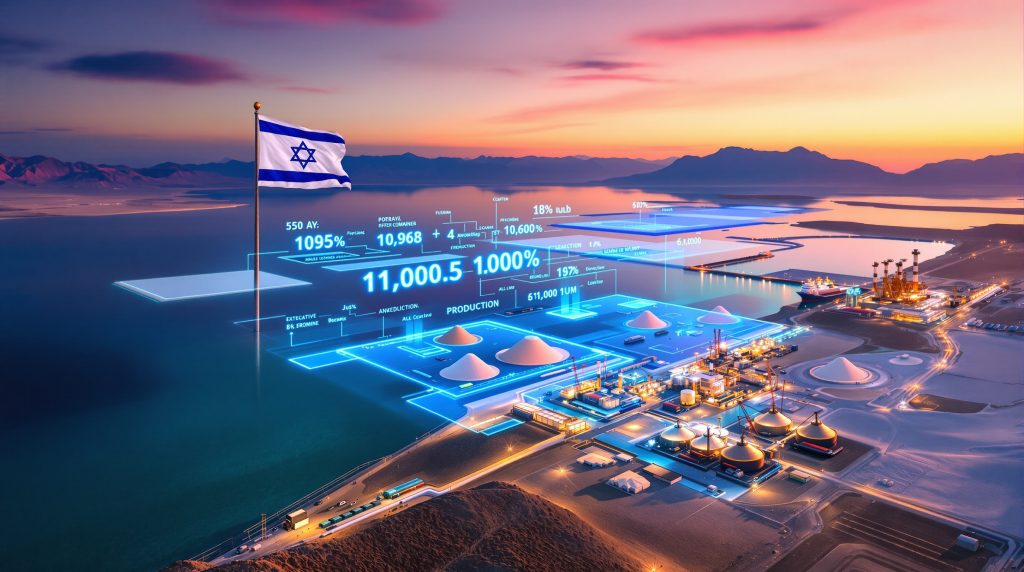What Is the ICL Dead Sea Concession and Why Does It Matter?
The ICL Dead Sea concession tender represents one of the world's most strategically important mineral extraction agreements, granting exclusive rights to harvest potash, bromine, magnesium, and specialty chemicals from the hypersaline waters of the Dead Sea. This concession arrangement, a legal framework that provides exclusive extraction rights from defined geographic areas in exchange for revenue-sharing agreements, has operated under singular control for over six decades.
ICL Group currently maintains these exclusive extraction rights through its Dead Sea Works subsidiary, which the company acquired in 1975. The subsidiary had already held the Dead Sea concession since 1961, creating an uninterrupted operational history spanning 64 years of exclusive control over this unique natural resource located at the Biblical site of Sodom.
The geographic scope encompasses the southern Dead Sea basin, where specialised industrial facilities extract approximately 3.8 million tons of potash annually alongside 170,000 tons of bromine. These operations require adaptation to the Dead Sea's unique environment, situated at approximately 1,410 feet below sea level, making it the lowest point on Earth's land surface and creating distinctive operational challenges.
The extraction process involves sophisticated chemical processing and mineral separation technologies designed specifically for high-salinity mineral compositions. Unlike conventional mining operations, Dead Sea mineral extraction utilises solar evaporation ponds and chemical precipitation methods to separate valuable minerals from the hypersaline brine.
Understanding Israel's Most Valuable Mineral Rights Agreement
The economic impact of Dead Sea mineral operations extends far beyond regional boundaries, generating $2.1 billion in annual revenue and representing 30% of ICL's total $7 billion yearly revenue. This substantial contribution positions the Dead Sea concession as a cornerstone asset within ICL's global operations, making it one of the world's largest potash producers.
ICL previously valued its Dead Sea assets at $6 billion, though the Israeli government's recent assessment resulted in a negotiated compensation package of $2.54 billion for asset transfer, with total potential compensation reaching approximately $3 billion when including future project development costs.
| Economic Indicator | Value | Significance |
|---|---|---|
| Annual Revenue | $2.1 billion | 30% of ICL's total revenue |
| ICL's Asset Valuation | $6 billion | Company's internal assessment |
| Government Compensation | $2.54 billion | Negotiated asset transfer value |
| Total Potential Package | ~$3 billion | Including future development costs |
Furthermore, the strategic importance of Dead Sea operations extends to global fertiliser supply chains, with ICL maintaining ongoing supply agreements with agricultural markets in China and India. Potash serves as a primary ingredient in commercial fertilisers, making the Dead Sea concession a critical component of international food security infrastructure.
Industry analysts indicate that if ICL loses the tender, the company could redirect the $3 billion compensation toward expanding operations in advanced agriculture, phosphate, bromine, and flame retardants sectors. This potential transformation could revolutionise the company's strategic focus and geographic presence.
Why Is Israel Launching an International Tender for the Dead Sea Concession?
Government Objectives Behind the Competitive Bidding Process
Israel's decision to launch an international tender for the ICL Dead Sea concession tender reflects a fundamental shift in natural resource governance philosophy. After five decades of exclusive operational control by a single entity, the Israeli Finance Ministry announced its intention to ensure the rightful share for the public and State from this unique natural resource through competitive international bidding.
The government's strategic objectives centre on maximising public revenue from natural resource extraction while creating transparency in resource allocation decisions. This approach represents a modern governance model that balances private sector operational efficiency with optimised public benefit extraction from national assets.
The timing of this announcement on November 6, 2025, signals the government's commitment to implementing a competitive, international, and equitable tender process. This represents a significant departure from the historical concession model, which granted exclusive rights without periodic competitive review.
The Finance Ministry emphasised that the tender process aims to ensure the rightful share for the public and State from this unique natural resource, marking a fundamental shift from decades of exclusive operational control.
The governmental rationale extends beyond revenue maximisation to include concerns about optimal resource utilisation, market alignment, and adherence to contemporary environmental standards. Similar tenure-based concession reviews have occurred globally, where governments reassess long-term mineral extraction agreements to ensure alignment with current economic and environmental priorities.
Timeline and Process Structure for the 2025-2030 Transition
The structured timeline for the ICL Dead Sea concession tender creates a carefully orchestrated transition spanning five years, designed to maintain operational continuity while enabling comprehensive competitive evaluation.
Key Timeline Milestones:
- Current concession expiration: March 31, 2030
- Tender launch: 2025 competitive international process initiated
- Winner selection target: 2027 for contract finalisation
- Operational transition period: 2027-2030 preparation and handover phase
- New operations commencement: April 1, 2030
The extended three-year preparation window from 2027 to 2030 provides successful bidders with comprehensive time for asset inventory assessment, infrastructure documentation, supply chain transition planning, and regulatory compliance verification. This timeline assumes no significant operational disruptions, regulatory changes, or bidding process delays.
However, ICL maintains operational continuity requirements through March 31, 2030, ensuring uninterrupted mineral extraction during the transition period. The memorandum of understanding signed between ICL and the Israeli government eliminates significant uncertainty and risk regarding concession termination while providing asset valuation certainty.
What Are the Financial Terms of ICL's Transition Agreement?
Asset Valuation and Compensation Framework
The financial structure of ICL's transition agreement represents a complex negotiation between the company's internal asset valuation claims and the government's independent assessment. ICL previously maintained that its Dead Sea assets were worth $6 billion, reflecting decades of infrastructure investment and operational development.
However, the negotiated settlement resulted in a significantly different valuation framework:
| Component | Value | Coverage Details |
|---|---|---|
| Base Asset Transfer | $2.54 billion | Infrastructure and operational assets required for ongoing operations |
| Future Project Costs | Variable | Actual development expenses during 2027-2030 transition |
| Total Compensation Package | ~$3 billion | Combined guaranteed compensation regardless of tender outcome |
The $2.54 billion base compensation covers infrastructure and operational assets necessary for full and ongoing operation of the Dead Sea concession. This represents a substantial reduction from ICL's $6 billion internal valuation, though the specific methodology used to determine this figure has not been publicly disclosed.
The variable future project costs component provides flexibility for development expenses incurred during the 2027-2030 transition period, ensuring that ICL receives compensation for investments made in preparation for operational transfer.
Strategic Implications of the Memorandum of Understanding
The memorandum of understanding creates a unique strategic position for ICL, simultaneously providing financial security while maintaining competitive opportunities. The agreement eliminates significant uncertainty and risk for ICL's operational and financial planning regarding the 2030 concession termination.
Market reaction was immediate and substantial: ICL's New York-listed shares declined 16.5% at 1835 UTC on November 6, 2025, reflecting investor concerns about operational continuity and future revenue streams. This share price decline represents significant shareholder value destruction, indicating market scepticism about ICL's ability to maintain its dominant position.
The guaranteed compensation structure creates parallel strategic pathways for ICL:
- Scenario 1: Successfully secure the new concession through competitive bidding and maintain operational control
- Scenario 2: Deploy $3 billion compensation capital into adjacent business segments including advanced agriculture, phosphate, bromine, and flame retardants
ICL retains the right to participate in the competitive tender process, positioning itself as what the company characterises as the most suitable candidate for operating the future concession based on five decades of accumulated operational knowledge and existing infrastructure investment.
How Will the Competitive Tender Process Work?
International Bidding Requirements and Criteria
The competitive bidding structure for the ICL Dead Sea concession tender represents a comprehensive evaluation framework designed to identify operators capable of managing large-scale industrial mineral extraction while maximising public benefit. The process remains open to global mining and chemical companies, creating opportunities for international investment and operational expertise.
Core bidder requirements include:
- Technical expertise in mineral extraction operations and chemical processing
- Financial capacity for capital-intensive operations exceeding $2.54 billion infrastructure requirements
- Environmental compliance experience in international mining operations
- Long-term operational planning capabilities for multi-decade concession management
- Regulatory compliance systems for mineral extraction facilities in complex geopolitical environments
The bidding process must accommodate the unique operational environment of the Dead Sea, where extraction methods differ significantly from conventional mining. Successful bidders must demonstrate competency in solar evaporation pond management, chemical precipitation processes, and hypersaline mineral separation technologies.
Evaluation Framework for Potential Bidders
The government evaluation framework encompasses multiple weighted criteria designed to balance financial returns with operational excellence and environmental stewardship. While specific weightings have not been disclosed, standard industry practice suggests the following evaluation structure:
Primary Evaluation Categories:
- Revenue Sharing Proposals – Financial terms and government revenue optimisation
- Environmental Protection Measures – Remediation commitments and sustainability integration
- Operational Efficiency – Production optimisation strategies and technical innovation
- Local Economic Impact – Employment creation and community investment commitments
- Technical Innovation – Advanced extraction and processing methodologies
The evaluation process prioritises comprehensive proposals that address both immediate operational requirements and long-term strategic objectives. Bidders must demonstrate capability to maintain current production levels while implementing enhanced environmental protections and community benefits.
Revenue sharing proposals represent the primary financial consideration, with bidders expected to offer competitive terms that exceed historical government receipts from the concession. The inclusion of local economic impact criteria indicates political importance of regional stakeholder benefit and employment preservation.
What Environmental Challenges Must the New Concessionaire Address?
Dead Sea Water Level Crisis and Industrial Impact
The environmental challenges facing the next Dead Sea concessionaire represent some of the most complex ecosystem management issues in modern mineral extraction. The Dead Sea experiences an annual water level decline of approximately 1.1-1.2 meters per year, creating unprecedented environmental pressures that future operators must address.
This dramatic decline results from multiple interconnected factors:
- Upstream water diversions from Israeli, Palestinian, and Jordanian extraction of Jordan River tributaries
- Industrial mineral extraction operations removing mineral-rich water from the ecosystem
- Natural evaporation accelerated by high solar radiation and arid climate conditions
- Reduced freshwater inflow due to climate change impacts on regional precipitation patterns
The current concession structure places limited environmental obligations on operators, creating a regulatory framework that environmental advocacy groups characterise as insufficient for Dead Sea preservation. This gap between operational requirements and environmental protection needs represents a critical challenge for future concession terms.
The Dead Sea's unique hypersaline ecosystem faces potential collapse when salinity and water level balances are disrupted beyond natural recovery thresholds. Similar decline patterns have occurred in other terminal lakes, including the Great Salt Lake and Aral Sea, where resource extraction and water diversion created irreversible ecological damage.
Proposed Environmental Requirements for Future Operations
Environmental advocacy groups are pushing for significantly enhanced protection measures in the new concession agreement, representing a fundamental shift from historical operational requirements. These proposed requirements reflect growing international recognition of the Dead Sea's ecological and cultural significance.
Key Environmental Enhancement Proposals:
- Environmental remediation fund establishment from concession revenues
- Mandatory saltwater pumping obligations to supplement natural water levels
- Enhanced monitoring and reporting requirements for ecosystem impact assessment
- Integration of sustainable extraction practices to minimise ecological disruption
The proposed environmental fund would create a dedicated financing mechanism for Dead Sea preservation activities, potentially funded through percentage allocations of mineral extraction revenues. This approach would directly link commercial benefits with environmental stewardship responsibilities.
Mandatory saltwater pumping represents a potential technological solution to water level decline, though implementation costs and effectiveness remain subjects of ongoing scientific evaluation. Such requirements would significantly increase operational expenses while potentially providing ecosystem benefits.
In addition, enhanced monitoring systems would create comprehensive data collection frameworks for tracking industrial impacts on Dead Sea ecology, enabling adaptive management approaches based on real-time environmental feedback. These waste management solutions could set new standards for mineral extraction operations worldwide.
Who Are the Potential Bidders for the Dead Sea Concession?
ICL's Competitive Position and Advantages
ICL Group maintains several distinctive competitive advantages in the upcoming tender process, rooted in its five decades of operational experience at the Dead Sea site. The company positions itself as possessing unparalleled expertise, stating it continues to believe it represents the most suitable candidate for operating the future concession based on accumulated operational knowledge and infrastructure investment.
ICL's Strategic Advantages:
- Existing infrastructure valued at $2.54 billion already optimised for Dead Sea operations
- Established supply chain relationships with major agricultural markets in China and India
- Technical expertise in specialised hypersaline mineral extraction processes
- Regulatory compliance history with Israeli government requirements
- Operational continuity capability during the transition period through 2030
However, ICL faces significant challenges in maintaining its dominant position. The 16.5% share price decline following the tender announcement indicates investor concern about the company's ability to compete effectively against potentially lower-cost international operators.
The guaranteed $3 billion compensation package creates both opportunity and risk for ICL. While financial security enables strategic planning regardless of tender outcome, the compensation may prove insufficient to offset lost Dead Sea revenue streams if alternative investments fail to generate comparable returns.
International Companies That Could Challenge ICL
The international tender process opens opportunities for several categories of potential bidders, each bringing distinct competitive advantages and strategic motivations. The global nature of the bidding process ensures access to significant financial resources and operational expertise from established mining and chemical industry leaders.
Potential Bidder Categories:
Global Potash Producers:
- Nutrien – Canada-based fertiliser giant with extensive global operations
- Mosaic Company – US-based phosphate and potash producer with international experience
- K+S AG – German potash and salt specialist with global mining expertise
Chemical Industry Giants:
- Large-scale chemical manufacturers seeking vertical integration in specialty mineral inputs
- Companies with existing mineral extraction capabilities and chemical processing expertise
State-Owned Enterprises:
- Resource-rich nations seeking strategic mineral asset control
- Government-backed entities with long-term investment capabilities
Private Equity and Investment Consortiums:
- Mining sector specialists seeking strategic mineral assets
- International investment groups focused on commodity market exposure
The diversity of potential bidders creates competitive pressure that could drive significant improvements in operational efficiency, environmental stewardship, and government revenue generation. International operators may offer innovative technologies and financing structures that exceed ICL's current operational model.
What Are the Market Implications of the Tender Process?
Impact on Global Potash and Specialty Chemical Markets
The ICL Dead Sea concession tender process carries significant implications for global potash and specialty chemical markets, potentially disrupting established supply relationships and creating price volatility during the transition period. The Dead Sea's strategic importance in global fertiliser supply chains means operational changes could affect agricultural markets worldwide.
Market Disruption Factors:
- Supply agreement renegotiation with established customers in China and India
- Production continuity uncertainty during operational transition periods
- Competitive pricing pressure from new operators seeking market share
- Technology integration potential improvements in extraction efficiency
The 30% revenue contribution to ICL's total operations means any operational disruption would significantly impact global potash availability. Agricultural markets dependent on Dead Sea potash supplies may need to develop alternative sourcing strategies during the transition uncertainty period.
Specialty chemical markets, particularly bromine and magnesium sectors, face similar disruption potential as new operators may prioritise different production allocations or implement alternative processing methodologies.
Investment Opportunities and Risks for Stakeholders
The tender process creates distinct risk and opportunity profiles depending on outcome scenarios. Investors and industry stakeholders must evaluate multiple potential developments and their associated market implications.
| Outcome Scenario | ICL Retains Concession | New Operator Selected |
|---|---|---|
| Operational Impact | Continuity with higher cost structure | Potential efficiency gains with transition risks |
| Supply Chain Stability | Maintained customer relationships | Possible contract renegotiations required |
| Investment Risk Level | Moderate (increased government payments) | High (operational uncertainty period) |
| Market Price Effect | Stable pricing with margin pressure | Volatility during transition implementation |
For ICL specifically, the tender outcome determines strategic direction for the next several decades. Successful retention requires accepting higher government revenue sharing while maintaining operational control. Loss of the concession necessitates successful deployment of $3 billion compensation into alternative growth sectors.
International investors face opportunities to access one of the world's most significant mineral extraction assets, though success requires substantial capital commitment and technical expertise in challenging operational environments.
How Could This Tender Reshape Regional Mining Operations?
Precedent Setting for Other Natural Resource Concessions
The ICL Dead Sea concession tender establishes a significant precedent for natural resource governance in the Middle East and beyond. The competitive bidding model demonstrates how governments can reassess long-term mineral extraction agreements to ensure optimal public benefit while maintaining operational excellence.
This approach influences neighbouring countries' mining policies by showcasing transparent resource allocation mechanisms that balance private sector efficiency with public revenue maximisation. The framework creates a template for environmental integration in extractive industries, potentially setting new standards for ecosystem protection requirements.
Regional Influence Factors:
- Transparent bidding processes for major resource extraction rights
- Environmental stewardship integration as mandatory concession requirements
- Public-private balance optimisation in natural resource management
- International expertise attraction through competitive processes
The success of this tender model could encourage similar approaches across the region, where significant mineral resources have historically operated under long-term exclusive arrangements without periodic competitive review. These mining reclamation innovations could influence future operations.
Long-term Strategic Implications for Israel's Resource Sector
Israel's implementation of competitive tendering for the Dead Sea concession signals broader strategic shifts in national resource management philosophy. This approach enhances government revenue from natural resources while potentially attracting international investment and operational expertise to domestic markets.
The tender process strengthens Israel's position in global mineral markets by demonstrating commitment to operational excellence and environmental stewardship. International operators may introduce advanced technologies and sustainable practices that exceed current industry standards.
Strategic Benefits Include:
- Enhanced government revenue through competitive bidding optimisation
- Improved environmental stewardship through enhanced regulatory requirements
- International investment attraction and technical expertise development
- Strengthened commodity market position through operational improvements
The precedent may extend to other Israeli natural resource assets, creating opportunities for similar competitive processes in gas extraction, mineral rights, and renewable energy development projects. This approach aligns with industry evolution trends seen globally.
What Should Investors and Industry Observers Watch For?
Key Milestones and Decision Points Through 2030
The ICL Dead Sea concession tender process unfolds across multiple critical decision points that will shape market dynamics and investment opportunities through the next decade. Understanding these milestones enables informed strategic positioning for investors and industry participants.
Critical Timeline Monitoring Points:
- 2025 – Tender Documentation Release: Official bidding requirements and evaluation criteria publication
- 2026 – Bidding Process Implementation: Technical evaluations and financial proposal submissions
- 2027 – Winner Announcement: Contract finalisation and transition planning initiation
- 2028-2030 – Asset Preparation Phase: Infrastructure handover preparation and regulatory transition
- April 1, 2030 – Operational Transfer: Complete handover to new concessionaire
Each milestone carries specific market implications and investment decision triggers. The 2025 documentation release will clarify exact bidding requirements and competitive dynamics, while the 2027 winner announcement determines strategic direction for all stakeholders.
Consequently, mining companies worldwide are closely monitoring the process, as it may influence how global mining innovations are implemented in similar operations.
Market Indicators and Performance Metrics to Monitor
Several key performance indicators will signal tender process progress and market adaptation to changing operational control. These metrics provide early warning systems for investment decisions and strategic planning adjustments.
Primary Monitoring Indicators:
- ICL share price movements and investor sentiment shifts related to tender developments
- Competitor strategic positioning announcements and partnership formation activities
- Environmental compliance developments and regulatory framework evolution
- Global potash market dynamics and pricing trend responses to operational uncertainty
- Supply agreement modifications with major agricultural customers in China and India
The interaction between these indicators will reveal market confidence levels and competitive positioning effectiveness throughout the tender process.
Furthermore, recent developments in other mining regions, including the Namibia mining halt situation, demonstrate how regulatory changes can significantly impact operations and investor confidence.
Disclaimer: This analysis involves forecasts, speculation, and forward-looking assessments regarding the ICL Dead Sea concession tender process. Market conditions, government policies, and competitive dynamics may change significantly during the 2025-2030 timeline. Investment decisions should consider multiple risk factors and seek professional financial advice. Information presented reflects conditions as of November 2025 and may require updates as the tender process develops.
Further Exploration:
Readers interested in learning more about mineral concession processes and Dead Sea extraction operations can explore additional industry resources and regulatory frameworks that provide broader context on international mining tender procedures and environmental management requirements in extractive industries. The government's announcement provides additional context on the environmental considerations driving this significant policy change.
Want to Capitalise on Mineral Discovery Opportunities?
Discovery Alert's proprietary Discovery IQ model delivers real-time alerts on significant ASX mineral discoveries, instantly empowering subscribers to identify actionable opportunities ahead of the broader market. Understand why major mineral discoveries can lead to substantial market returns by exploring Discovery Alert's dedicated discoveries page, showcasing historic examples of exceptional outcomes, and begin your 30-day free trial today to position yourself ahead of the market.




